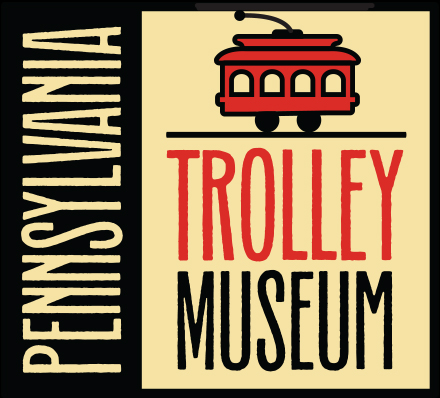Trolleyology
Join PTM staff, volunteers, and members for our Zoom series, Trolleyology! These programs feature Pennsylvania transit history topics and tales of our collection that you can experience from home. Registration is required but free of charge. Donations are welcome and encouraged.
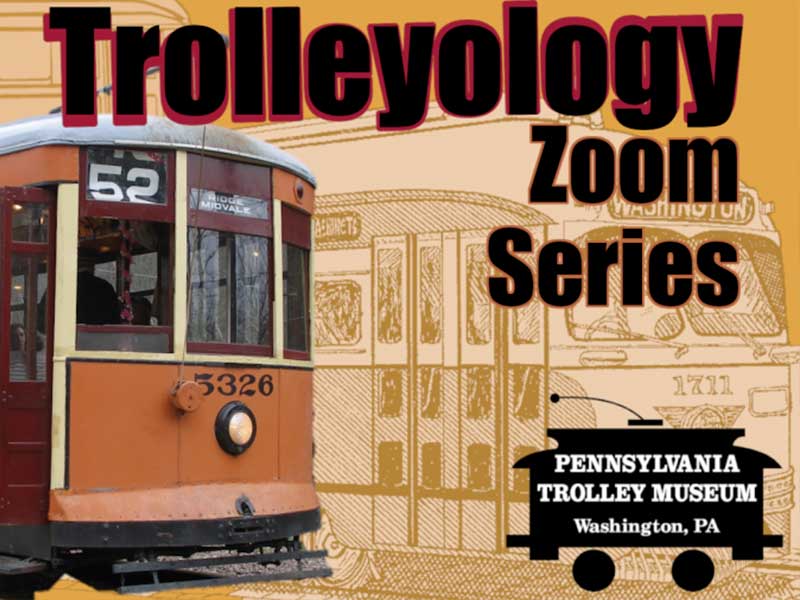
Schedule
Trolleyology presentations will continue on a regular or semi-regular basis. Interested in presenting? Email Kristen at kfred@patrolley.org! We’re specifically looking for programs related to the Trolley Era in general, Pennsylvania transit history, or stories about our collection. Please join our e-mail list to stay up-to-date with program announcements and other PTM news!
*For the best experience, we recommend downloading Zoom in advance.
Upcoming Programs
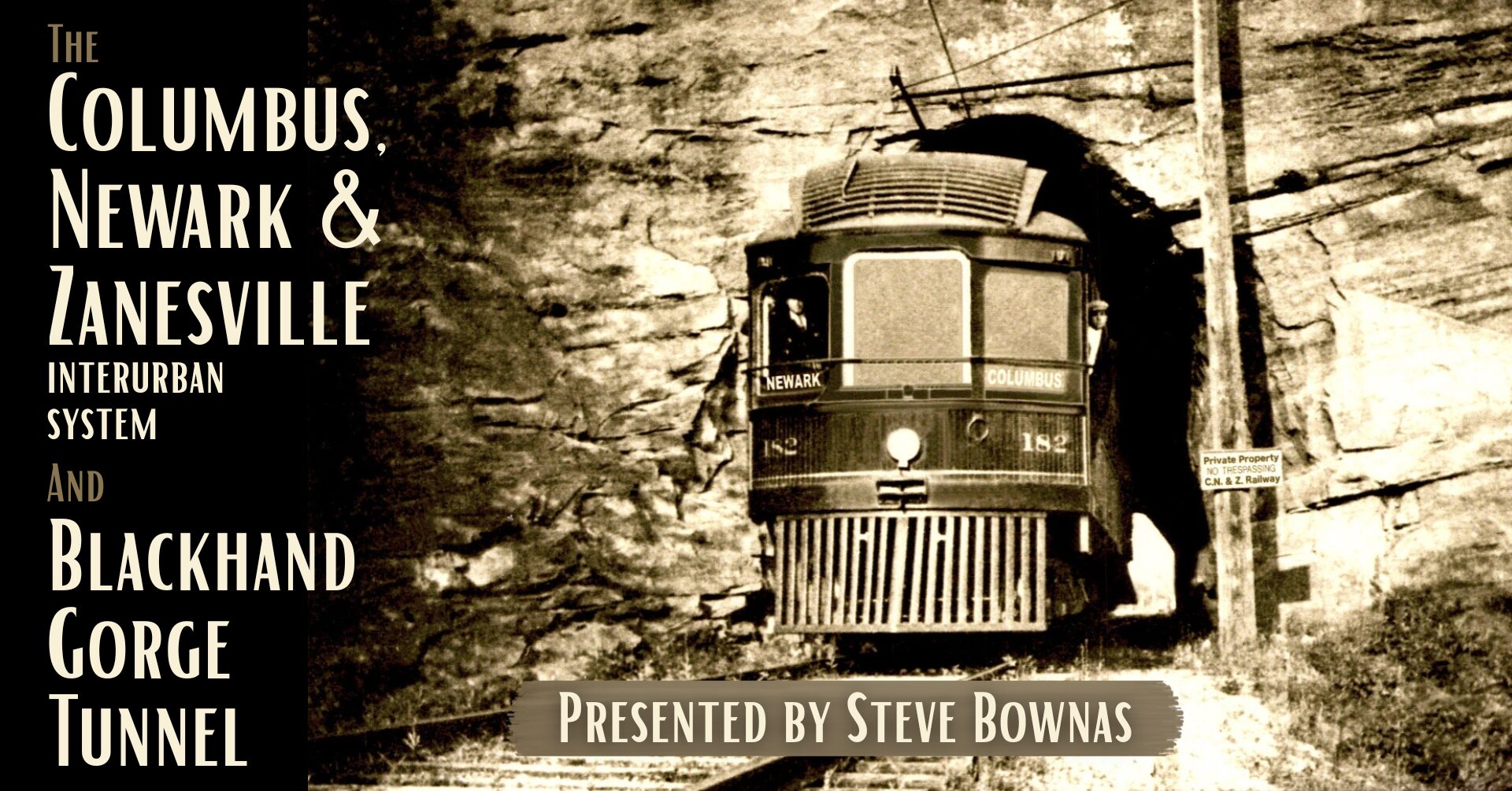
The Columbus, Newark & Zanesville Interurban System and Blackhand Gorge Tunnel
November 19, 2025 - 7 PM ET - Presented by Steve Bownas
REGISTER HERE
Come explore the electric interurban lines that formed the Columbus, Newark and Zanesville system in east central Ohio. We will follow them from the 1899 start of the pioneering Newark & Granville; through the boom of the Columbus, Buckeye Lake & Newark and the Columbus, Newark & Zanesville; into their 1907 lease to the Ohio Electric Railway; and finally to the 1921 spinoff after the OE dissolved. And of course we will examine the Midwest's only interurban tunnel in scenic Blackhand Gorge! This program will be recorded.
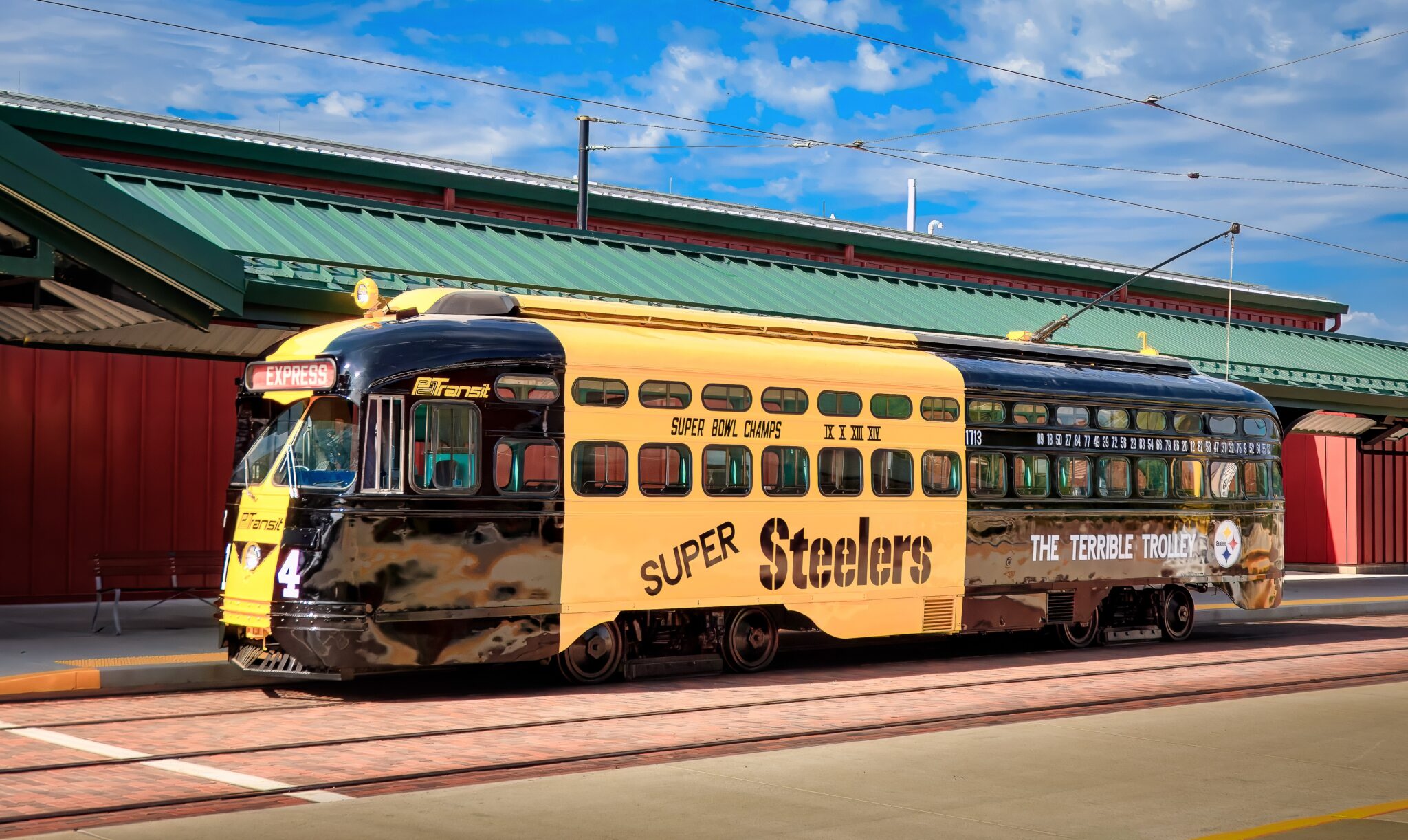
The Terrible Trolley Rides Again
December 16, 2025 - 7 PM ET - Presented by Pennsylvania Trolley Museum staff - Michael Buchta, Jeanine DeBor, Kevin Zebley, and Kristen Fredriksen
Registration coming soon
Car 1713, better known as The Terrible Trolley, returned to the Pennsylvania Trolley Museum in 2023 soon after we discovered it was stored in a building in Ohio. Project manager Michael Buchta along with Kevin Zebley will detail the restoration process, while Jeanine DeBor and Kristen Fredriksen will discuss the car's history and cultural impact. Don't miss this Terrible Trolleyology - the last in 2025!
Previous Programs
These programs may be available for outreach presentations. If your club, organization, or group is interested in a digital program, please email Kristen at kfred@patrolley.org.
Many previous presenters have given permission for the Museum to share their programs on PTM’s YouTube Account. Click here for the Trolleyology playlist!
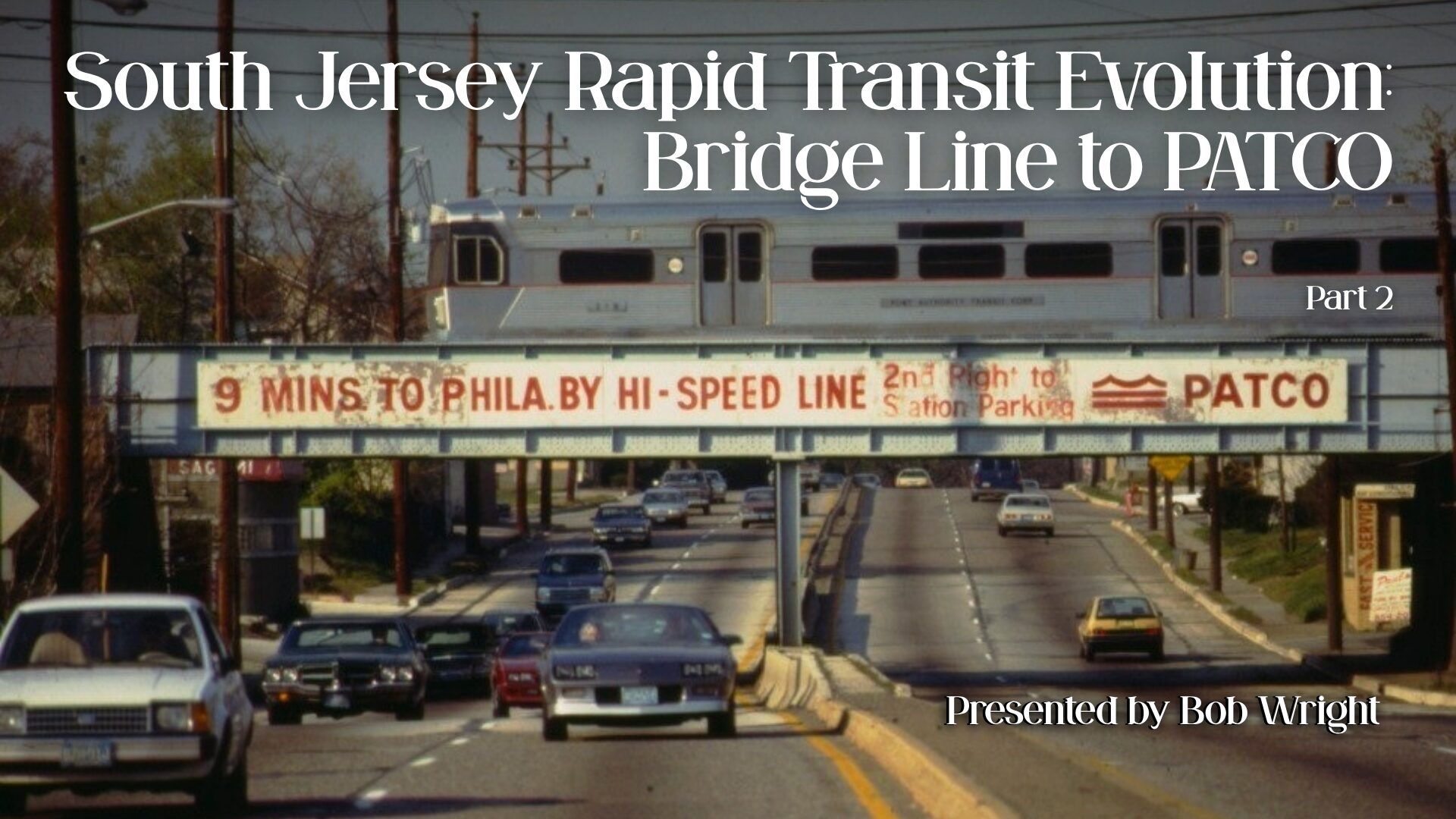
South Jersey Rapid Transit Evolution - Bridge Line to PATCO, Part 2
October 29, 2025 - 7 PM ET - Presented by Bob Wright
RECORDING COMING SOON
As PATCO reached its 22nd year of service in 1990, its popularity was increasing and ridership was reaching new levels. With reinstated rail connections to Atlantic City and expanded park-and-ride facilities at its New Jersey stations, as well as the establishment of a feeder bus service arrangement with NJ Transit, the ridership growth came as no surprise. There remained the question of expansion, the impediment of the former Bridge Line and its limitations in the line's service to Philadelphia, and the realization that consideration had to be given to the line's infrastructure and fleet, each of which would need to be addressed in the early 2000s and therefore planned and programmed to budget and obtain funding. Part 2 of this presentation will describe PATCO's task to upgrade and renew to continue to serve its coverage area into the 21st century.
Watch Part 1 here!
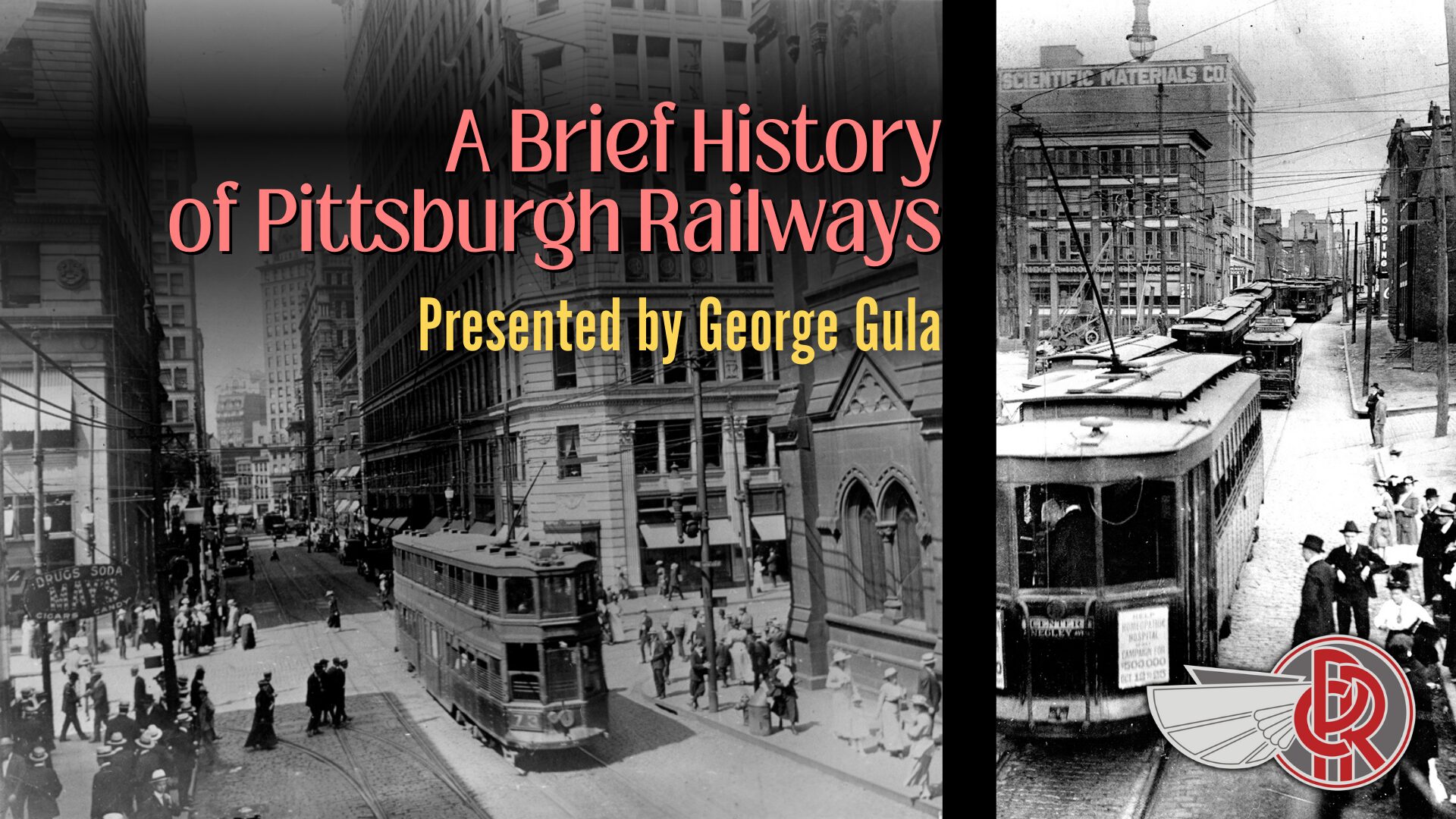
A Brief History of Pittsburgh Railways
September 23, 2025 - 7 PM ET - Presented by George Gula
RECORDING COMING SOON
With many photos and maps, George Gula approaches this presentation from the corporate development point of view, telling the story of the many different properties and how they combined to form an organization which was never as successful as some railfans would like to assume.

Frankford's Elevated Railway and Its Predecessors - Part II
August 19, 2025 - 7 PM ET - Presented by Harry Garforth
RECORDING COMING SOON
The first of two programs based on the book “Frankford’s Elevated Railway and Its Predecessors” covered the history of rail transportation in Frankford from 1833 up to the opening of the Frankford Elevated in November 1922. This included early railroad operations, streetcars (including steam dummies), streetcar electrification, planning and construction of the elevated and its placement into service.
Part II will continue the story of the Frankford Elevated’s 100 years of service along with its companion project, the Bustleton Trolley. The program will also include new vehicles introduced on the line and changes to the numerous feeder routes including vehicle mode changes. Part II will also cover the complete renovation of the elevated, stations and new terminals.
The book can be purchased on line at:
The $25 donation price benefits the Historical Society of Frankford. The book is also available in the Pennsylvania Trolley Museum store.
South Jersey Rapid Transit Evolution - Bridge Line to PATCO, Part 1
July 22, 2025 - 7 PM ET - Presented by Bob Wright
The PATCO High Speed Line, connecting Center City Philadelphia and suburban South Jersey, evolved from a transit plan and a bridge envisioned over 100 years ago. The construction of the Delaware River Bridge crossing its namesake river made the trip between Pennsylvania and New Jersey much more efficient and easy and changed commuter patterns and trips to and from the Jersey Shore. A short rapid transit that was built with the bridge expanded into a major rail service in the 1960s and introduced innovative automated operation and fare collection. Part 1 of this program will cover the origins of the service in the 1920s up through the creation of PATCO in the early 1960s and on to 1990.
A Feast of Deck Roof Cars
June 19, 2025 - 7 PM ET - Presented by Rich Allman
Dr. Rich Allman will present “A Feast of Deck Roof Cars,” including black and white photos from Pennsylvania (Philadelphia, West Chester, Philadelphia Rapid Transit, Fairmount Park, Hershey, York, Wilkes Barre, Conestoga, Pittsburgh and Lehigh Valley), as well as photos from Baltimore, Boston, Washington, Brooklyn, Third Avenue and Public Service, plus rapid transit cars in Boston, Chicago, the BMT and Staten Island Rapid Transit.
Rich is a member of several rail organizations, including the Pennsylvania Trolley Museum (#1003) and the East Penn Traction Club which he joined in 1984 and served as president from 1989-1991 and 2001-2003. His traction interests include historical and modern light rail operations worldwide, preservation, collecting photographs, and HO scale traction modeling. Rich is a physician in clinical practice and education, having served on the clinical faculty of Einstein Medical Center Philadelphia since 1992, and was associate director of the residency program in internal medicine. He was medical staff president from 2006-2009 and again from 2015-2016. Rich is currently the lead consultant in clinical ethics at Einstein and also oversees residents in internal medicine in their outpatient experience. Rich is an associate professor of medicine at the Sidney Kimmel School of Medicine of Thomas Jefferson University.
Frankford's Elevated Railway and Its Predecessors - Part I
May 21, 2025 - 7 PM ET - Presented by Harry Garforth
This program was rescheduled from May 14 due to a power and internet outage at the presenter's home!
The first of two programs based on the book “Frankford’s Elevated Railway and Its Predecessors” will cover the history of rail transportation in Frankford from 1833 up to the opening of the Frankford Elevated in November 1922. That will include early railroad operations, streetcars (including steam dummies), streetcar electrification, planning and construction of the elevated and its placement into service.
Part II will continue the story of the Frankford Elevated’s 100 years of service along with its companion project, the Bustleton Trolley. The program will also include new vehicles introduced on the line and changes to the numerous feeder routes including vehicle mode changes. Part II will also cover the complete renovation of the elevated, stations and new terminals.
The book can be purchased on line at:
The $25 donation price benefits the Historical Society of Frankford. The book is also available in the Pennsylvania Trolley Museum store and will be available at the East Penn Traction Meet in May.
100+ Years of Suburban Philadelphia High-Speed Interurban History
April 22, 2025 - 7 PM ET - Presented by John Calnan
This program from John Calnan will cover the history of the Philadelphia & Western Railroad and its successor operators, the Red Arrow Lines and SEPTA. In addition, slides will discuss scheduled service patterns, vehicles operated, track maps, signage, unique facts, and other interesting tidbits.
One Month and Counting: October 14, 1971
March 25, 2025 - 7 PM ET - Presented by David Warner
During high school student Dave Warner’s first visit to Pittsburgh in the spring of 1971, he learned that three of the remaining streetcar lines would be converted to buses later in the year. That knowledge was the impetus for walking and photographing all of the Route 44-Knoxville, images which are available to see on the previous Trolleyology video, Pittsburgh Streetcars – April 1971.
A fall teacher’s workshop closed school for two weekdays in October, and that gave Dave a timely opportunity to spend a day in Pittsburgh with the goal of photographing the portions of the 53-Carrick line which he hadn’t photographed in April, along with a few photos of the 49-Beltzhoover line which was the third of the lines on the chopping block. The day of photography included much more than a photo-filled half-day walking along Brownsville Road, such as middle-of the night rides to Library and night photography at the Tunnel Car House. The day of photography ended with an impressive parade of PCCs through Dormont, some on trackage which was replaced with a unique suburban light rail tunnel when the trolley lines remaining after 1971 were upgraded to light rail standards, rather than bustituted.
A Century+ of Philadelphia Trackless Trolleys (The PRT/PTC Years)
February 25, 2025 - 7 PM ET - Presented by Bob Wright
*NOTE* This Trolleyology was accidentally recorded to the local computer, meaning that unfortunately there is no way to remove the participant boxes on the right side of the screen. We apologize for this oversight and if we have the chance to re-record this program with Bob Wright, we'll do so!
The Philadelphia Rapid Transit Company (PRT) began a trial of trackless trolleys in 1923, instituting new Route 80 across South Philadelphia that was operated with a small fleet of very basic coaches. This would not be the first trackless operation in the United States, with service in Staten Island and a handful of small communities being started before this, but it would become the longest lasting. The Philadelphia Transportation Company (PTC), which succeeded PRT in 1940, doubled the number of trackless routes in the city with conversion of a busy streetcar route, and several more were implemented post-World War II. This presentation will cover the trackless operation through PRT and PTC up until the system's takeover by SEPTA in 1968. Watch Bob's first presentation (1968-present) here!
Streetcars of Wilkes Barre
January 29, 2025 - 7 PM ET - Presented by George Gula
Join us for our first Trolleyology of 2025 featuring Wilkes-Barre streetcars from the beginning to the end of service, plus the trolleybus era. Explore each route with PTM volunteer George Gula!
Electric Cars in the Electric City
November 20, 2024 - 7 PM ET - Presented by George Gula
Scranton’s first horsecar operation was chartered in 1865, and the nation’s first successful electric streetcar operation began on November 29, 1886. By 1900, Scranton Railway Company served Pennsylvania’s 3rd largest city with almost 100 miles of track. This program covers the development of the system from the earliest horsecar days to the end of service on December 18, 1954.
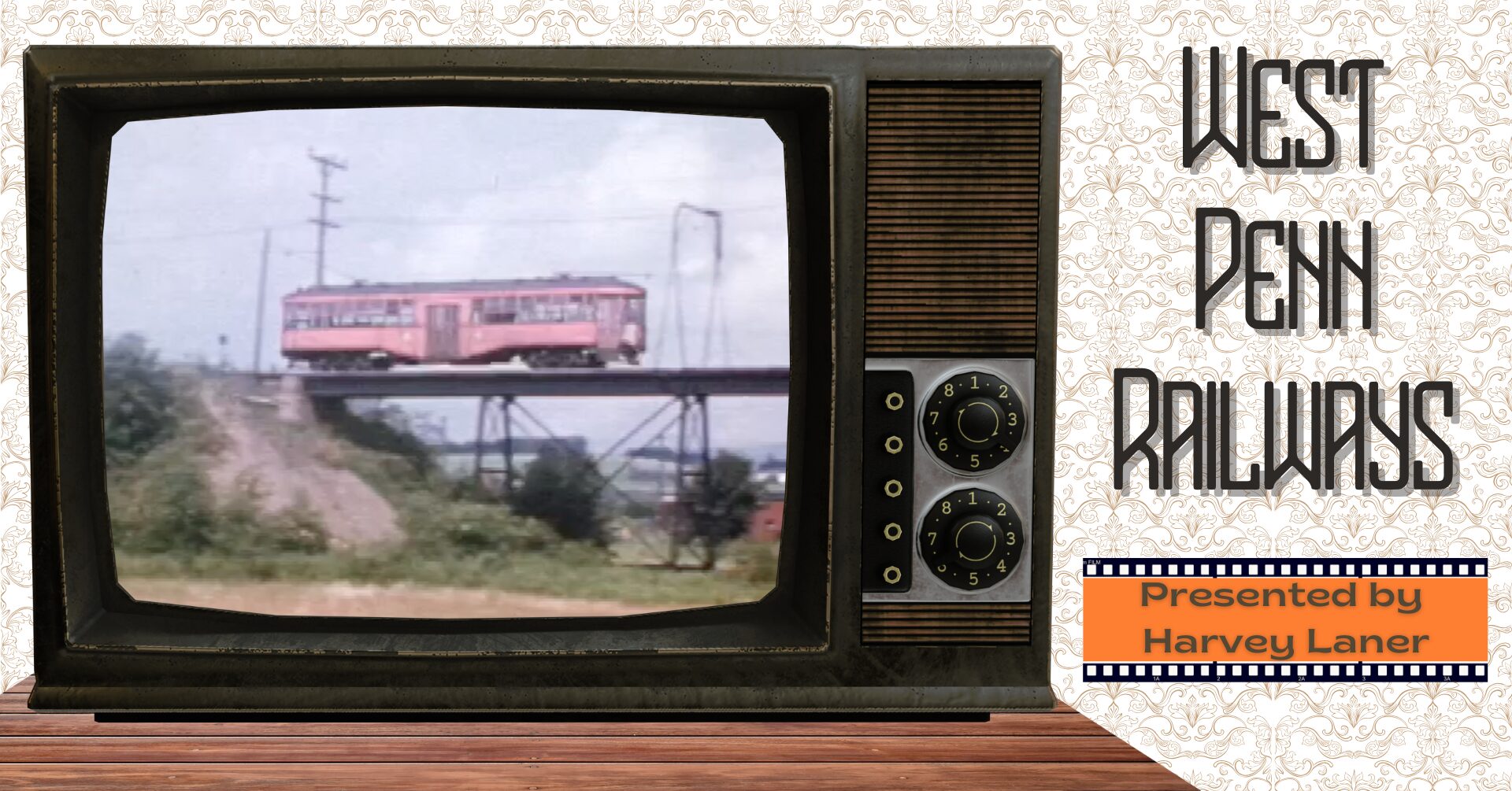
West Penn Railways
October 29, 2024 - 7 PM ET - Presented by Harvey Laner
NOTE: This program was not recorded at the presenter's request
RUNTIME: 1 hour 5 minutes
At its peak, West Penn Railways had 237 miles of electric railway trackage. It operated in the well populated coal mining and coking region of rugged, mountainous western Pennsylvania. West Penn Railways was a vibrant transportation system playing a key role in the pre automobile, unpaved, poor road era, and was an important factor in the Coking region’s economy.
This program combines Harvey Laner’s West Penn Railways video files of railfans Ed Miller and Gene Schmidt’s movies with Harvey’s conversational narration with West Penn Railways historian Ed Lybarger. Ed meticulously describes the route as Ed Millers’ movies take us from Uniontown to Greensburg. Ed Lybarger details West Penn’s LCL freight service, an in-depth description of the Company’s passenger and work car equipment, a whimsical look at West Penn’s creative advertising program and an overview of the management people that guided the Company through the good and the difficult years.
This complete story of West Penn Railways includes a look at the web of public utilities that connect it to West Virginia’s Monongahela & West Penn and Wheeling Traction Company properties as well as the Hagerstown & Frederick Railway in Maryland. Historic movie scenes of those traction properties are also included in this far reaching, comprehensive program.
A Century+ of Philadelphia Trackless Trolleys (1968-Present)
October 15, 2024 - 7 PM ET - Presented by Bob Wright
Trackless trolley operation in Philadelphia began in 1923 and this mode continues in regular service in the city to this day. The trackless system remained a relatively small one over the years but did include a number of significant routes on the system through the Philadelphia Transportation Company's ownership and to the present day with SEPTA. The story will be told in two parts, with Part 2, the SEPTA era (1968-present), being provided as the initial offering. Part 1, the start of the system with the Philadelphia Rapid Transit (PRT) company and later PTC, will be offered at a future date.
Trolleys, Trains, and Transit Museums
September 19, 2024 - 6 PM ET - Presented by Kristen Fredriksen and Polly Desjarlais
How does a museum celebrate and preserve transit history? By travelling outside its walls! Transit Museums are often in a unique position to host excursions on their vintage fleets and lead tours in the systems of their home cities. The NY Transit Museum and the Pennsylvania Trolley Museum are no exception. Join Kristen Fredriksen, Manager of Public Programs and Outreach at the Pennsylvania Trolley Museum, and Polly Desjarlais, Content Manager at the NY Transit Museum, to hear about each location’s early transit history, their respective museum origin stories, and program highlights.
Note: This program, while not officially part of Trolleyology, will take the place of a September Trolleyology program. Registration is exclusively through the New York Transit Museum's website. Please reach out to Kristen at kfred@patrolley.org if you have any trouble registering!
A Glimpse At New Orleans Streetcars
August 20, 2024 - 7 PM ET - Presented by Earl Hampton
This presentation from lifelong streetcar enthusiast and author Earl W. Hampton, Jr. introduces viewers to the streetcars of New Orleans past and present. As a grammar school streetcar fanatic, Earl witnessed the shrinking system and bus replacements, followed by the preservation of New Orleans streetcars around the country and the efforts to restore and build new streetcar lines. Earl shows the effect Hurricane Katrina had on the system in 2005 and gives viewers a special look at PTM’s car 832 in service.
Meet Me Beneath Public Square: The Saga of Cleveland's Subways
July 16, 2024 - 7 PM ET - Presented by Dr. Craig Semsel
This presentation will address various plans to build a Cleveland subway. It will look at three distinct periods of time (Progressive Era, 1920s, 1950s) when planning reached a fairly advanced stage and the people of Cleveland voted on whether or not to go forward with construction. Despite the optimism of their promoters, only one small subway was ever built. We will look at the subway that got built, and two “near misses” that got away…
The Second Career of the Twin Cities PCC Cars: The Newark City Subway
June 18, 2024 - 7 PM ET - Presented by Matt Nawn
Following the story of the Twin Cities Lines PCC Cars presented earlier this year by Aaron Isaacs, Matt Nawn will discuss the second careers of the thirty former Twin Cities Lines PCC Cars that served the citizens of Newark, NJ for nearly five decades. At first glance, the story of thirty identical cars serving a single rail line may not seem very exciting, but Matt will share some interesting and unique aspects of this 100% PCC Car operation, including some little-known facts about some of the cars and the dedicated crews who maintained them. Matt will also touch on the dispositions of these cars after their departure from Newark, including some cars that have gone on to a remarkable third career.
Rails to Victory – Allied Rail Operations in Europe Before and After D-Day
June 5, 2024 - 7 PM ET - Presented by Hans Altena
For the first time in English, this program from Hans Altena will share the history and logistics of Allied rail operations in Europe leading up to and after D-Day. Many countries had an immediate need for massive quantities of railroad rolling stock following the destruction of their cities and landscapes during WWII. Explore this often overlooked chapter of railway history with us!
Presenter Hans Altena played a significant role in the repatriation of two Whitcomb diesel locomotives that have been back in the Netherlands since 2018. Hans is the chair of the “Stichting 162” (162 Foundation) which has fully restored a War Department locomotive and several freight cars.
Pittsburgh Streetcars: April 1971
5/21/2024 - 7 PM ET - Presented by David Warner
In the spring of 1971, the Pittsburgh streetcar system was a mere shadow of its former glory, and it was about to shrink even more. For a high school student visiting the city for the first time, however, what remained was intoxicating, with plenty of activity. This show follows a teenage Dave around the South Hills as he rode and photographed the tired-looking, but incredibly fascinating remaining routes. Featured subjects include the single-track, rush-hour only operation between Castle Shannon and Mt. Lebanon, which is now part of the PRT Red Line, and the hilltop lines in Beltzhoover, Allentown and Knoxville, which had just over half a year left to run.
The Cincinnati Subway
4/23/2024 - 7 PM ET - Presented by Jacob Mecklenborg
Cincinnati, OH is infamously known as the home of the longest abandoned subway tunnel in the United States. Local historian Jacob Mecklenborg, author of Cincinnati's Incomplete Subway: The Complete History, will present on the project's genesis, construction, and abandonment, as well as 1930s-era proposals to convert the unused rapid transit line for use by the Cincinnati Street Railway. The presentation will include new photos and other information collected since the book's publication in 2010.
Toronto streetcars: past, present and future
3/20/2024 - 7 PM ET - Presented by Brian Doucet
Toronto has North America’s largest streetcar network. Its 10 routes carry around 200,000 daily riders, and they are a ubiquitous sight throughout much of the city. This presentation will trace the early history of transit in Toronto, including the municipalisation of the streetcar system in 1921. Toronto had the largest fleet of new and used PCCs in North America. Though the network contracted after World War II, this was predominantly due to subway expansion, rather than bus replacement. The system was saved in 1972 in large part due to a small group of dedicated activists, leading to the development of new generation of streetcars and new lines. Today’s system features a mix of new, low-floor LRVs and legacy operating practices which means that Toronto’s streetcars, while iconic, are a slow way of getting around the city. Across southern Ontario, light rail is expanding as a new wave of transit investment is shaping development in one of North America’s fastest growing urban regions.
Throughout this presentation, we will weave the story of the streetcars with one of an ascendant city which transitioned from a modest, predominantly British and provincial city, to Canada’s leading metropolis, its global mega-region and one of the world’s most multicultural cities. This presentation will feature many images taken by the late John F Bromley, a Toronto-based streetcar enthusiast who travelled extensively to photograph trams and trolleys between the 1960s and 2019. As a bonus, we will end with some of his Pittsburgh images from the mid-1960s!
Beaver Valley Traction
2/20/2024 - 7 PM ET - Presented by George Gula
The first horsecars of the Beaver Valley Street Railway Company began running on July 4, 1885. Electric streetcar service started on December 5, 1891. Eventually, a number of companies would be created and merged into the Beaver Valley Traction Company which connected Morado Park, Beaver Falls, Beaver, Rochester, Freedom and Aliquippa, ending at the Edgeworth Borough line. The Philadelphia Company, which also owned Pittsburgh Railways, purchased the BVT and unsuccessfully attempted to link the two properties after being stymied by Sewickley and Edgeworth Boroughs. After it was turned loose on its own, the line experienced ever worsening circumstances. The last car ran on August 10, 1937. This program will show the rise and fall of the streetcar in Beaver County from 1885 to 1937.
Pennsylvania Trolley Museum Celebrates 70 Years
2/7/2024 - 7 PM ET - Presented by Bruce Wells
This program will be both LIVE at the museum (members only) and on Zoom! On February 7, 1954, the first three cars in PTM's collection arrived at the museum. This program will celebrate 70 years of history at PTM with a look back at where we started and how we got to now!
The Long Careers of the Twin Cities PCC Cars
1/16/2024 - 7 PM ET - Presented by Aaron Isaacs
They started life in the Twin Cities of Minneapolis-St. Paul and are now one of the last fleets of PCC cars still in revenue service, having traveled far and wide. With lots of photos, Minnesota Streetcar Museum historian Aaron Isaacs will tell you their story, which started with a PCC that was supposed to go to Pittsburgh.
Hoosier Heartland Trolley Co.: Preserving and Reviving Indiana's Electric Railway Story
12/13/2023 - 7 PM ET - Presented by Cameron Nichols and Austin Mace of the Hoosier Heartland Trolley Company
The Hoosier Heartland Trolley Company is an Indiana nonprofit founded in 2018 to save some of the last remaining railroad cars representing Indiana’s rich electric railway heritage. The organization exists to spark imagination in people across all walks of life regarding the art, science, culture, technology, and economic empowerment of Indiana’s electric railway industry from the 20th century - at one time moving 7 million passengers annually across more than 2,000 miles of railroad to connect cities and rural communities.
The Indiana nonprofit is developing the state’s only electric heritage railway to immerse Hoosiers in authentic transportation experiences as a community asset for education, placemaking, and economic development. Join us and the Hoosier Heartland Trolley team to learn more about Indiana's electric railways, the current restoration of an Indiana interurban that is now operable after 80 years of slumber, and what the future holds!
More information regarding Hoosier Heartland Trolley Co.'s preservation efforts, news, and development can be found at hoosiertrolley.org.
Philadelphia Transit Overview 1858-1968
11/14/2023 - 7 PM ET - Presented by George Gula
Join Pennsylvania Trolley Museum volunteer George Gula for a journey through the history of Philadelphia surface and subway transit from the first horsecars in 1858 up to the start of the Southeastern Pennsylvania Transportation Authority (SEPTA) in 1968. This program received rave reviews when it was previously shared during the Hoosier Traction Meet - but if you have to miss out, this presentation will be recorded and available on PTM's YouTube Trolleyology playlist!
Cemetery Transit: A History of Death Riding the Rails
10/10/2023 - 7 PM ET - Presented by Allison C. Meier
Transportation and the cemetery have been linked for centuries, from 19th-century ferries carrying the dead in New York City to early 20th-century funerary street cars in Mexico City. Every city had to find a way to move its departed citizens to their final stop, such as Pittsburgh's Citizens Passenger Railway Horsecar, which in 1859 established a route between Fifth Avenue and a cemetery. This online talk led by Allison Meier, the author of Grave (Bloomsbury, 2023) and a cemetery tour guide, will chronicle these surprising connections between the dead and transit both in the United States and around the world, including a look at some historic curios like the London Necropolis Railway and presidential funeral trains.
Frank Who?
8/29/2023 - 7 PM ET - Presented by Tom Laurenson
Frank Sprague is an unsung electrical genius who was born in Milford, Connecticut. People traveling today in modern trolleys/streetcars/trams are doing so courtesy of his inventions, and anyone taking a train into Grand Central Terminal in New York can see another of his inventions, from 1903, in daily use. To find out more about this remarkable man and his influence on modern transport, join Shore Line Trolley Museum volunteer Tom Laurenson on August 29th. And what could be the connection between Frank Sprague and the Massachusetts Museum of Contemporary Art? Find that answer too!
Where the Heck is Hecla?
7/25/2023 - 7 PM ET - Presented by Dennis Cramer
Join Pennsylvania Trolley Museum volunteer Dennis Cramer for a route by route look at West Penn Railways in Westmoreland County including historical and current photographs, maps showing consolidation of operation over the years, and some reflections on life in a patch.
Railroads, Art and American Life: An Artist's Memoir
7/11/2023 - 7 PM ET - Presented by author J. Craig Thorpe
Collecting more than thirty years of paintings and renderings (including 2 featuring the Pennsylvania Trolley Museum), Railroads, Art, and American Life tells the story of rail transportation in America through the life and works of artist J. Craig Thorpe. His artwork depicts not only the golden age of train travel but considers the present and looks forward to a potential future.
Featuring more than 130 color illustrations and combining history, biography, ethics, and humor, Thorpe’s personal story joins with his paintings to invite the reader to relive the heyday of American rail and better understand the role of railroads in our society today.
This presentation highlights the book and Thorpe's story and is specially tailored to an electric railway and traction audience.
The Mount Washington Transit Tunnel Disaster - Book Talk
6/27/2023 - 7 PM ET - Presented by author Mary Jane Kuffner Hirt
On Christmas Eve 1917, an overcrowded, out-of-control Knoxville #4236 trolley exited the Mount Washington transit tunnel and crashed onto Carson Street. Twenty-three passengers and pedestrians were killed; over 80 were injured. It was the worst transit accident in the history of the City of Pittsburgh. The crash scene was chaotic as bystanders and P&LE Railroad employees frantically worked to remove the victims from the crash site. Most of those affected resided in Beltzhoover, Knoxville and Mt. Oliver. In the aftermath, public outrage over the tragedy led to criminal prosecution, civil suits, and the bankruptcy of the Pittsburgh Railways Co. “The Mount Washington Transit Tunnel Disaster,” by local author, Mary Jane Kuffner Hirt, documents the story.
The McKeesport Trolley Lines of Pittsburgh Railways - Part 2
5/16/2023 - 7 PM ET - Presented by George Gula
Pittsburgh Railways operated two lines between Pittsburgh and McKeesport (Routes 56 and 68), as well as a local line from McKeesport to Glassport (Route 98) and one along Evans Avenue (Route 99). Part 2 covers Route 56 – McKeesport via Second Avenue. The line had a lot of private right-of-way and really was a quick way to McKeesport. We'll start at Pirl Street Loop again and then we're off and running with presenter George Gula!
The McKeesport Trolley Lines of Pittsburgh Railways - Part 1
5/3/2023 - Presented by George Gula
Pittsburgh Railways operated two lines between Pittsburgh and McKeesport (Routes 56 and 68), as well as a local line from McKeesport to Glassport (Route 98) and one along Evans Avenue (Route 99). This program from George Gula will feature views along the lines as we ride from end to end.
Cleveland Transit 1955-1975: Mobility Redefined
4/18/2023 - Presented by Richard A. Krisak
This presentation attempts to cover the transit highlights in Cleveland over this tumultuous twenty-year period. The streetcar era was over, replaced by the new modern “Rapid Transit” (including a soon-to-be-built downtown subway), and a revitalized surface network of new trolley buses and motor coaches. The post war economy was booming, and Cleveland ranked as the seventh largest city in the U.S., having just reached its population zenith at just under one million residents. The city’s population swelled by thirty percent daily from employment activity within one of the nation’s largest industrial centers.
However, forces were gathering on the horizon that no one could envision would cause the dramatic rapid decline of this vibrant city. In many ways Cleveland represents a case study of a declining urban America. Industrial decline, job loss, suburbanization and school desegregation ravaged the city’s population and its transit system. Eventually, Mobility was Redefined, exemplified by the struggle between rapid transit expansion and an aggressive highway building campaign – transit lost.
Declining ridership, increased labor costs and rising fares put the transit system into a “death spiral” that would eventually result in the creation of the Greater Cleveland Regional Transit Authority in 1975.
The Dayton and Xenia Railway (And How NOT to Abandon a Rail Line)
3/8/2023 - Presented by Tom Morrow
As an interurban center at the turn of the 20th Century, Dayton OH was home to 9 different interurban electric railway routes. Three of those routes were eventually run by the Dayton & Xenia Railway -- two of them to Xenia, OH, and the third to Spring Valley, OH. We'll walk through the history of how the lines started and the trials and tribulations of building them.
Nowadays the steps to formally abandon a railroad line have been long practiced and are well established. In 1905, there was no recipe to abandon a line (nor had it been practiced much) when D&X began to abandon the Dayton-Xenia Rapid Transit -- we'll look at the four-year effort it took to accomplish that.
Jim Crow Streetcars - Challenging Separate But Equal
2/21/2023 - Presented by Eric Madison
Mr. Madison will discuss the origins of segregation on streetcars beginning in the 19th century and the attempts made nationwide to challenge both the custom and later the codification of "separate but equal" practices
Super Saturday Streetcar Specials
1/31/2023 - Presented by Steve Barry
Steve Barry shares photos from the annual Super Saturday Streetcar Special charters. Steve has run the Super Saturday Streetcar Specials for the Wilmington Chapter NRHS on the Saturday before the Super Bowl for 28 years - and we're only a few weeks away from the 29th! Since the charters first started in the 1990s, a variety of equipment has been used, from PCCs to Kawasaki cars to PCC-2s — and early on, even a Peter Witt. The trips have also ventured out into Red Arrow twice. This program highlights the first 28 years of Super Saturday Specials.
Philadelphia's Subway-Surface Lines
12/14/22 - Presented by Matt Nawn and Harry Donahue
Harry Donahue and Matt Nawn will provide an educational journey into the history, present operations, and future of Philadelphia’s Subway-Surface Trolley Lines. This program is designed to appeal to enthusiasts, historians, and transportation professionals as Harry and Matt discuss the origins, operation, vehicles, and some unique aspects of this backbone of Philadelphia’s city trolley network.
Ohio Electric Railway
11/9/2022 - Presented by Bill Van Doren
This 617 mile Ohio Electric Railway system broke up in 1921 but only lasted in its entirety from 1906 until 1917. Despite its complex structure of leases and stock control, the rumor that Ohio Electric owned nothing but the paint on its cars was not totally true—they did own the Lima Toledo outright, and upon dissolution OE was renamed L-T. They provided city service in seven cities, Columbus having been sold off early. The complex corporate structure included Ohio Electric, the Millcreek Valley out of Cincinnati, the Cincinnati Traction Co, the Cincinnati Zoo, and the Cincinnati Car Co. The original Toledo entrance was to have been along the Maumee River and over city streets but instead saw the construction of the quarter mile long Tontogany Viaduct -- it still barely stands and is for sale by the State of Ohio for $100 to anyone who will restore it. The company was in trouble from the beginning and never recovered from the 1913 Midwest flood. This program touches on all the OE lines.
To cover such a large enterprise in one session obviously means that only the highlights can be covered. Still, Ohio Electric looms large in traction history and should be of interest.
Heading Home on the Main Line: A Century of Pennsylvania Railroad Commuter Rail Operations in Philadelphia
10/25/2022 - Presented by Al Churella
Take a ride along the Main Line. During the late 1800s, the Pennsylvania Railroad tracks that stretched west of Philadelphia played a pioneering role in the emergence of commuting by rail, as well as the development of what we now call suburbia. By the time of World War I, those commuter lines featured the initial phases of what became the nation’s most important system of electrified tracks. After World War II, PRR and Reading commuter services were a money-losing proposition and played a key role in the development of governmental subsidies for public transportation. While Philadelphia never rivaled the vast array of commuter services that characterized Greater New York, the City of Brotherly Love represented in microcosm the evolution of commuter rail in the United States.
Trolley Trails through the North Hills: The Pittsburgh, Harmony, Butler and New Castle Railway
10/11/2022 - Presented by Bill Fronczek and Scott Becker
Bill Fronczek and Scott Becker from the Pennsylvania Trolley Museum will share photos and history from this interurban streetcar line north of Pittsburgh along with information about the preservation, relocation, and restoration of Wexford station.
The Colorful Streetcars of Pittsburgh
7/19/2022 - Presented by George Gula
Pittsburgh’s streetcars have featured some colorful paint schemes through the years. Advertisements and calls to action also resulted in many memorable appearances. George Gula will present these eye-catching designs from a historical perspective!
Dayton’s Interurban History
6/28/2022 - Presented by Tom Morrow
Dayton, Ohio was a key interurban connection between the great Ohio and Indiana systems, with nine separate lines radiating from Third and Main, starting in 1895 with the last vestige removed in 1941. Tom Morrow will walk us through the interurbans which were found in the Gem City.
Pittsburgh: Streetcar City
5/31/2022 - Presented by Chris Walker, George Zrust, Dennis Cramer, Bruce Wells, and Ed Lybarger
This program will highlight the Pennsylvania Trolley Museum’s newest publication featuring high-quality photos and lively discussion from the team who put the book together!
Port Authority’s Electric Bus Initiative
5/24/2022 - Presented by David Wohlwill
Port Authority has eight forty-foot battery electric buses in its fleet which operate in the eastern sector of Port Authority’s service area. This presentation will discuss the choice of electric propulsion for transit buses, the challenges of implementing electric bus technology, state and federal funding for the program, Duquesne Light Company’s partnership, and the experience to date with their operation. The presentation will also cover future plans to expand the electric bus fleet, including their proposed use in the Downtown – Oakland bus rapid transit corridor.
The Short-Lived History of the PCC Car in Cleveland
5/9/2022 - Presented by Richard A. Krisak (+The Last CTS PCC Fan Trip, 3/8/1953)
Cleveland was the fifth largest city in the U.S. following WWII with an increasing population and a growing economy. It operated one of the larger intact street railway networks in the nation with substantial and growing post war ridership. Although Cleveland was an early member of the ERPCC it was a late adopter of the PCC. This presentation will focus on the short seven-year life span of the PCC car on Cleveland streets. The initial 1938 demonstration by Cleveland Ry., and the subsequent 1946 purchase and operation by the Cleveland Transit System (CTS) will be covered. How events during the CTS post war modernization plans influenced the decision to purchase the initial fleet will be examined. The subsequent decisions that led to their sale to TTC and the demise of the entire streetcar system will also be discussed. Featured in detail will be the last PCC fan trip that traversed five car lines and five operating stations, some that never saw a PCC in revenue service.
Philadelphia Commuter Rails, a 40-Year Retrospective
4/20/2022 - Presented by Steve Barry
The title says it all! Join Steve Barry for a program of PCCs and Kawasakis, Brill and St. Louis cars along with Kawasaki cars on the Red Arrow, Bullets and Strafford cars (and modern N-5s) on the Norristown line, the Market-Frankford El, and the Broad Street Subway.
Car C-145: The Story of a Wandering Snow Sweeper
4/11/2022 - Presented by Matt Nawn and Harry Donahue with Matthew Nawn and Andrew Nawn
Philadelphia Rapid Transit C-145 has quite a unique history having been preserved by three different museum organizations in three states and is the only electric trolley car ever to operate in both Philadelphia and Pittsburgh. Recently, the sweeper has been the focus of several youth-led projects. Join Matt Nawn, Harry Donahue, and Matt’s sons Matthew and Andrew as they discuss this car’s story and recent restoration to its 1926-1940 appearance.
A Ride to Washington, PA
3/15/2022 - Presented by George Gula
It’s the program we’ve all been waiting for! The Pennsylvania Trolley Museum lies along the route of the former Pittsburgh to Washington interurban – follow along on a virtual photo ride with George Gula as we meander our way from the city through the South Hills and Canonsburg to Washington, PA. The local lines in Washington will also be covered.
Shaker Heights Rapid Transit: The PCC Era
2/16/2022 - Presented by Bram Bailey with Rich Krisak
The program will briefly introduce the Shaker Heights Rapid Transit and PCC cars. Bram Bailey will discuss the classes of PCC car that ran on the SHRT as well as those that were acquired second hand. Learn a bit about the technical differences and spotting features of each class! The final phase of the program co-presented with Rich Krisak will take a visual tour of the line starting at Cleveland Union Terminal all the way to Green Road. Return to Shaker Square, we’ll venture out on the Van Aken Line to Warrensville Yard and return westbound to the CUT. The program will include a variety of photos taken in areas not open to the public, an overall map of the system, and track plans for each major terminal as well as Kingsbury Shops. This program is focused on the prototype, but will also be useful for anyone interested in modeling SHRT.
*Proceeds from this Trolleyology registration received by February 28 were designated for the Pennsylvania Trolley Museum’s Shaker Heights #94 fund.
PCC Car 2168 – A Streetcar Survival Story
2/9/2022 - Presented by Matt Nawn and Harry Donahue
Car #2168 is one of the most popular preserved transit vehicles from Philadelphia, but many people may not know its history, why this car was saved from scrap, how its preservation made an impact, and what’s involved with ensuring a “restored” trolley car stays safe, reliable, and sustainable for current and future generations. Matt Nawn and Harry Donahue covered the detailed restoration of this car in previous programs but haven’t delved into the why behind this car and what its future holds.
The Isle of Man Transport System, British Isles
1/11/2022 - Presented by Ian Longworth, Director of Transportation, Isle of Man
The Isle of Man still enjoys an integrated transport system with a single management team overseeing the operation. A Division of the Department of Infrastructure, Isle of Man Government, which provides key services to the whole country which is only 100 miles round the coast. Whilst an overview of the network will be given the main focus will be on the light rail side where much renewal has taken place in more recent times as the importance of the heritage rail operations has been appreciated.
*All the railways and tramways use the original rolling stock and are operating railways not preserved as they have never closed!
Schuylkill Railways: Trolleys Through the Anthracite Coal Fields
12/8/2021 - Presented by Mike Szilagyi and Andrew W. Maginnis
1892 marked the year that trolleys began serving the thriving boroughs, anthracite mines, and patch villages of northern Schuylkill County, Pennsylvania. Schuylkill Railway’s finest hour came in 1916 when a long-awaited trolley line across Broad Mountain was completed. As late as the 1920s batches of new steel Brills replaced old trolleys. When an all-bus system took over, Schuylkill Railway’s fleet of solid Brill cars went west, where they served reliably into the 1950s. Noted transit historian Andrew W. Maginnis and author Mike Szilagyi join forces to present this illustrated history.
The Laurel Line: Scranton to Wilkes-Barre
11/23/2021 - Presented by George Gula
At the turn of the 20th Century, the densely populated Lackawanna and Wyoming Valleys were major producers of anthracite coal. Developers decided to build a successful electric railway to connect the towns from Carbondale south to Scranton and Wilkes-Barre, but quickly changed their plans to build a railroad capable of handling heavy coal trains as well as an intense passenger service. Construction of the line, powered by a third rail, saddled it with an enormous debt it was never able to get out from under. This show, the second of two parts, is a color photo tour of the line from Scranton to Wilkes-Barre, as it existed in the early 1950’s. The majority of the marvelous photos were taken by the premier photographer Edward S. Miller. So come trackside to relive the final years of the line, but don’t step on the third rail!
The P&AV: Two Places This Line Never Reached
11/9/2021 - Presented by Dennis Cramer
The Pittsburgh & Allegheny Valley Railways Company was one of two trolley lines in Armstrong County. Both began as independent entities and were eventually purchased and operated by West Penn Railways. The P&AV ran between Apollo & Leechburg along the Kiskiminetas River in the valley that has hosted river, canal, railroad, highway and trolley transportation over the years. The P&AV, like many small town trolley companies, had high expectations, but was never able to achieve those destinations included in its name. This program will feature now and then images, maps and personal reflections of a small part of rural Pennsylvania.
Trolleys in Chocolate Town: Hershey Transit
10/26/2021 - Presented by George Gula
Hershey trolleys began operation in 1904. Forty-two years later, the final cars ran in 1946. The intervening years saw the company running west to Hummelstown, east to Palmyra and Lebanon and south to Elizabethtown. At its height, Hershey Transit operated a booming freight business as well as passenger service through Chocolate Town. Connections were made with Harrisburg Railways, Reading Transit & Light, the Ephrata & Lebanon system and Conestoga Traction. This show from George Gula will present a history and a view of this fascinating Central Pennsylvania system.
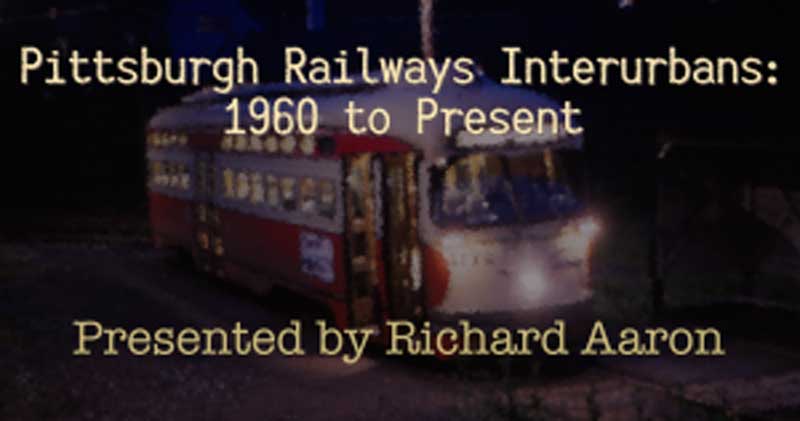
Pittsburgh Railways Interurbans: 1960 to the present
11/21/2021 - Presented by Richard Aaron
Rail service in Pittsburgh’s Saw Mill Run valley goes back as far as the early 1800s with the Pittsburgh Railways Company interurban service opening a century later. This presentation will review the history of this rail service and examine the last sixty years of light rail operations in the valley. We will see photographs at most of the stops on the Library and Drake routes in a “then and now” format. This will show the metamorphosis of the railway into a contemporary light rail line. There also will be coverage of some special movements and events.
*Recording unavailable at presenter’s request.
Car Line Adventures – Trolley Tales from the Sublime to the Ridiculous (but mostly ridiculous…)
8/10/2021 - Presented by Jack Demnyan
Horsing Around: The Horsecar and the Origins of Urban Mass Transportation
7/7/2021 - Presented by Sarah Wells
Explore the time before electricity moved us! Sarah Wells will discuss the innovations that allowed rails to be added to streets and why it was so important to find a new, cleaner, motive power. Learn more about horsecars, including the Pennsylvania Trolley Museum’s horsecar and its preservation story.
Shoes, Snack Foods, and Streetcars – The Electric Railways of Hanover, PA
6/1/2021 - Presented by Matthew Nawn and Andrew Nawn
Hanover, Pennsylvania has been known in the past for shoes, and in recent decades is known for snack food production. However, much less is known about the local street railway system that served the greater Hanover area until 1932 and the interurban railway that connected Hanover with York until 1939. The father and son team of Matt and Andrew Nawn, both Hanover residents, will tell the story of the interesting electric railways that once served this industrial and agricultural center of south-central Pennsylvania.
Women in Transit
5/19/2021 - Presented by George Gula
Stories are often told of women serving as motorettes during WWII, but did you know that women entered the transit industry much earlier? Tune into this program from George Gula to hear about some of the earliest accounts of women working on streetcars and learn how the role of women in the industry has evolved over time.
Lessons Learned from PCC Car Restorations
5/4/2021 - Presented by Matthew Nawn and Harry Donahue
Matt Nawn and Harry Donahue will share their experiences managing and participating in PCC car restoration projects at several museums, with a focus on lessons learned that can be helpful to any restoration project. This presentation will cover many features of the restoration of a PCC car, including the carbody, interior, trucks, control system, and finishing details. Matt and Harry will also discuss tips for upkeep and maintenance of these cars once restoration is completed. This presentation should be a good follow-on to the January Trolleyology presentation on the history of PCC cars.
Cincinnati and Its Inclined Plane Railways (Plus: A Look at the 2200 Series Cars of the Cincinnati Street Railway)
4/20/2021 - Presented by Phil Lind
The program from Phil Lind will feature photos and history of the 5 incline planes that were operated in Cincinnati, Ohio between 1872 and 1948. We will examine each one and cover its operations from beginning to end. After the incline program, Phil will show images of Cincinnati Street Railway 2200 class cars, of which PTM has #2227. Lastly, Phil will share images of 2227 from the 1950s.
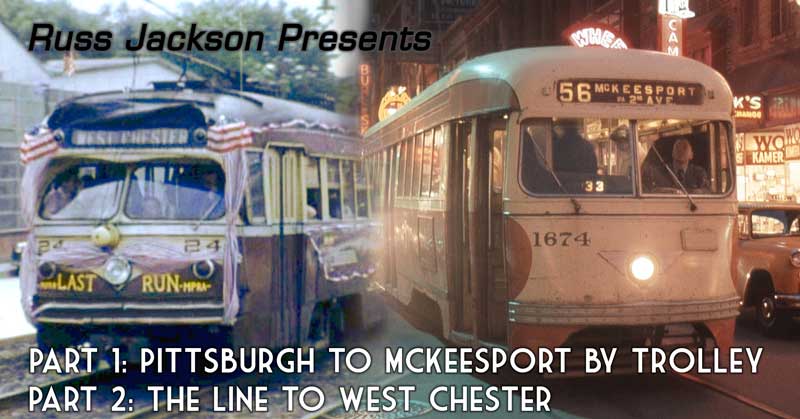
Pittsburgh to McKeesport by Trolley + Turnpikes and Trolleys: The Line to West Chester
4/8/2021 - Presented by Russ Jackson
Member Russ Jackson will show a video “Pittsburgh To McKeesport By Trolley”. The outbound trip will be shown using slides and the return trip will feature digitized 8mm film taken with a tripod-mounted camera adjacent to the trolley motorman. With its cross-country running, Russ always liked to consider the route 56 as an interurban line, taking one to a small city that once hosted 5 or 6 separate trolley lines. That such a trolley line existed as long as it did is quite remarkable.
Following the McKeesport presentation, Russ will show the film “Turnpikes and Trolleys: The Line to West Chester”. The suburban counties surrounding Philadelphia, one of the country’s largest cities, for the most part had their county governments situated near major roads, often called turnpikes, or ‘pikes’ (e.g. Baltimore Pike, the Lancaster Pike, the Bethlehem Pike). The roadway featured in this video is the West Chester Pike. The magic of electricity made it possible to enhance the use of these roadways by building trolley routes along them, thus finally superseding the sole use of live horsepower for transportation. The same was true of many country roads. Typically county seats had several trolley routes radiating from them, making them more easily accessible from country villages and towns by the means of the most modern method of local transportation then in existence, the electric trolley. The majority of the turnpike and country road trolley lines operated at speeds of 30 miles per hour or less, but some were designed for 50 to 60 miles per hour speeds. The line to West Chester was among the latter, and had a much longer life than most. Therefore rail system historians were able to capture operations of that line on color film. This video is a 70+ year look back into that era.
*Recording unavailable at presenter’s request
Cleveland Transit – Years of Transition
3/23/2021 - Presented by Rich Krisak
This program focuses on the early 50s when the last streetcars ran, the new rapid transit opened and the wires came down on the Cleveland Union Terminal electrification.
Trolley Watches
3/9/2021 - Presented by Philip Sauerlender
Philip Sauerlender will talk about specialized pocket watches made for interurban electric railway employees. These watches were made specifically to meet the requirements of the interurban railway industry which flourished briefly during the first third of the twentieth century. This program will explain the need for these watches, describe their characteristics, show their advertising, and illustrate many examples.
Red Arrow Lines
2/23/2021 - Presented by John Nicholson
That the Red Arrow has been one of the country’s most successful traction companies is borne out by the fact that much of it continues to operate today under the auspices of SEPTA. CERA’s John Nicholson will present a PowerPoint program taking you back on a journey over the Red Arrow lines with color images dating from the early 1940s to the present.
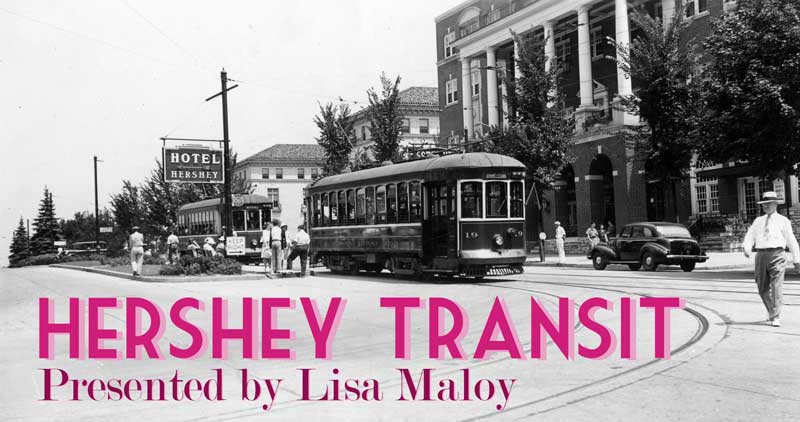
Hershey Transit
2/9/2021 - Presented by Lisa Maloy
Lisa Maloy from Friends of the Hershey Trolley will present a slideshow featuring the Hershey Transit system, the milk freight operations with the Hershey Company, the passenger operations through town, and the efforts of the Friends to preserve and share this aspect of Chocolate Town, USA’s history.
*Recording unavailable at presenter’s request.
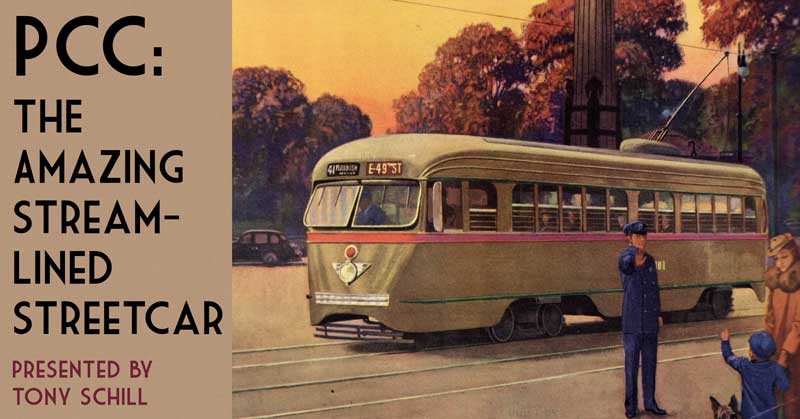
PCC: The Amazing Streamlined Streetcar
1/26/2021 - Presented by Tony Schill
“A Thing of Beauty is a Joy Forever.” So proclaimed a mid-1930’s Westinghouse ad featuring the new PCCs then arriving at transit systems all over North America. Back when the poet Keats penned those words in the early 1800s, he obviously did not have the PCC car in mind. But the words nevertheless remain appropriate in reference to the PCC, even today. The PCC car was a technological and aesthetic triumph that was intended to assure the long future of the traditional electric street railway industry. That goal was successfully achieved, but only for a while.
Just 20 years after the debut of the PCC it had become apparent that the traditional streetcar systems in North America were slowly rolling toward eventual extinction. Happily, that extinction never occurred, though it came all too close. Indeed, the PCC car was a major factor in keeping the streetcar industry alive just long enough to reach the light at the end of the tunnel—light rail and modern streetcar. Let’s go back and take a ride through PCC history!
*Recording unavailable at presenter’s request.
Keeping up with the Joneses: The Life and Career of Mr. P.N. Jones of the Pittsburgh Railways Co.
1/13/2021 - Presented by Father Jack Demnyan
Most Pittsburgh transit fans are familiar with the Jones’ Low Floor Car, that ubiquitous “yellow car” trolley which was the mainstay vehicle for Pittsburgh Railways Co. from the WWI era until the arrival of the PCC streamlined cars. Few, however, know much about the man behind the machine – Mr. P.N. Jones. This presentation will focus on his life and career with the Railways while uncovering a few surprises along the way.
Johnstown – Last of the Small-Town Trolleys: 60th Anniversary of the Last Day
+ Bonus: Last Day of Service on the Munhall Line in Pittsburgh
10/13/2020 - Presented by Jim Graebner
Were it not for the sharp climb of the Pittsburgh Railways Company’s Fineview line, the Johnstown Traction Company’s Morrellville line’s steep grade at its outer end would certainly have been more well-known. As it is, the system is fondly remembered as the “last of the small-town trolleys” and will be the subject of this October Trolleyology presentation by Jim Graebner.
Small Town Trolley Along the Allegheny River
10/7/2020 - Presented by Dennis Cramer
Armstrong County, Pennsylvania was home to 2 separate trolley lines during the first third of the twentieth century. This program will focus on one of them. The Kittanning & Leechburg Railways Company, a small rural line ran for 10 miles in the middle of Armstrong County from 1899 to 1936 that became part of the West Penn Railways System in 1911. The focus of this presentation by Dennis Cramer will be on the communities of Kittanning and Ford City along with a look at Lenape Park, an amusement park owned by the railways company.
A Ride to Charleroi
9/29/2020 - Presented by George Gula
Join PTM Volunteer George Gula for a virtual interurban ride from Pittsburgh through Charleroi south to Roscoe. The scenic Charleroi line featured a number of bridges, followed today’s Routes 51, 88, and 837, and connected the big city with small towns in Allegheny and Washington County until its abandonment in 1953.
A Look Back at the Trolleys of Irwin
9/22/2020 - Presented by Andy Blenko
In the first half of the 20th century, trolleys brought tremendous growth and change to the Borough of Irwin and its surrounding towns in Westmoreland County. This program from Andy Blenko looks at how the town was served by trolleys and rise and fall of those trolley companies.
On the Warpath! Pennsylvania’s Trolleys during WWII
6/16/2020 - Presented by George Gula
Transit systems were considered vital war industries, yet it was difficult to keep the trolleys running during the war.
Labor shortages, equipment shortages, and a strike involving an army takeover of at least one Pennsylvania property were only some of the issues faced by those running public transit in Pennsylvania. Join volunteer George Gula to see how it was accomplished during WWII.
Allegheny Valley Route
6/9/2020 - Presented by Dennis Cramer
The lower Allegheny Valley, just north of Pittsburgh, hosted three streetcar lines in the early 20th Century, each of them part of a different corporate structure. The Allegheny Valley (West Penn), Tarentum, Breckenridge & Butler and Route 78 of Pittsburgh Railways served the heavily industrialized area along the lower Allegheny River valley.
This presentation, based upon the book Allegheny Valley Trolleys, will be presented by Dennis Cramer, one of the authors and former Chief Instructor of Operator Training at the Pennsylvania Trolley Museum.
When Bad Things Happen to Good Trolleys
6/3/2020 - Presented by George Gula
Whenever a trolley left the car barn for its day’s work, trouble was never far behind. In this presentation, volunteer George Gula shares a collection of derailments, collisions, floods, snow and ice incidents and all the other things that made the motorman wish he had stayed home and the trolley wish it had stayed in the depot.
Wexford: Station, Post Office, Deli, and Back Again
5/26/2020 - Presented by Scott Becker
The Wexford Station served the Pittsburgh, Harmony, Butler & New Castle Railway (“The Harmony Route”) from 1908 until the last trolley ran in 1931. After its life as a passenger and freight station, the building was purchased, moved, and used as a post office, antique shop, and most recently, a deli.
Join Executive Director Scott Becker for a Trolleyology talk about Wexford Station, the route it served, its relocation to the Pennsylvania Trolley Museum, and its reopening in 2016.
